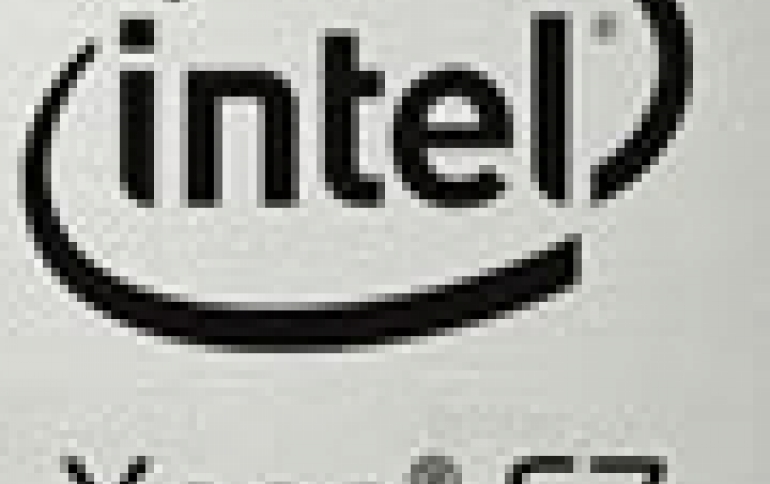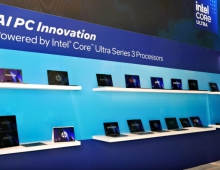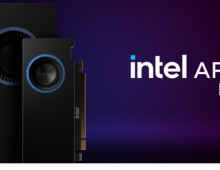
Intel Releases 10-core Xeon Processor Family
Intel today announced the new E7-8800/4800/2800 server processor families for high-end computing applications, including business intelligence, real-time data analytics and virtualization.
Based on Intel's 32-nanometer (nm) process technology, the new Intel Xeon processors have up to 10 cores with Intel Hyper-Threading Technology, and deliver up to 40 percent greater performance than the Intel Xeon 7500 series processor. Concurrently, a new energy-saving feature reduces the power draw of idle portions of the chip. Beginning today, more than 35 systems based on the Intel Xeon processor E7 family are expected to ship from manufacturers around the world.
 The new processor family contains 18 new processors for two-, four- and eight-socket servers, and is expandable to servers with 256 sockets. It also sets more than a dozen world records in performance. A 40 percent improvement in generational compute-intensive performance can enhance the pace and accuracy of applications in such fields as scientific research and financial services where speed is essential. With up to 25 percent better performance with virtual machine applications than the current generation, the new chips also hold the industry's highest virtualization performance.
The new processor family contains 18 new processors for two-, four- and eight-socket servers, and is expandable to servers with 256 sockets. It also sets more than a dozen world records in performance. A 40 percent improvement in generational compute-intensive performance can enhance the pace and accuracy of applications in such fields as scientific research and financial services where speed is essential. With up to 25 percent better performance with virtual machine applications than the current generation, the new chips also hold the industry's highest virtualization performance.
IT managers seeking to achieve greater economic efficiencies can replace 18 dual-core servers with a single Xeon processor E7-based server. To help address rising energy costs, the new Xeon chips include Intel Intelligent Power technology that dynamically reduces idle power consumption of the chip based on the workload while also delivering advanced processor power-management capabilities.
Intel is offering 10 advanced 10-core versions of the chip, led by the E7-8870, E7-4870 and E7-2870, all of which reach 2.4 GHz with a TDP (Thermal Design Point) of 130 watts.
 The company also announced a version of the chip that combines the benefits of high performance with low voltage, as well as a frequency-optimized version. The 10-core low-voltage E7-8867L reaches 2.13 GHz with a TDP of 105 watts, while the eight-core frequency-optimized E7-8837 tops out at 2.67 GHz with a TDP of 130 watts.
The company also announced a version of the chip that combines the benefits of high performance with low voltage, as well as a frequency-optimized version. The 10-core low-voltage E7-8867L reaches 2.13 GHz with a TDP of 105 watts, while the eight-core frequency-optimized E7-8837 tops out at 2.67 GHz with a TDP of 130 watts.
Intel Xeon processor E7 family based-platforms add a 2 Terabyte of memory in a four-socket system supported by the new processors. Most of these chips also contain Intel Turbo Boost Technology, Intel Hyper-Threading Technology and Intel Virtualization Technology (VT), which can increase performance as required, ease multitasking and enhance reliability and manageability, respectively.
Intel is bringing its security technologies available today in its mainstream Intel Xeon processor 5600 series, to the mission-critical server segment with the introduction of platforms based on the Xeon processor E7 family. Intel Advanced Encryption Standard New Instruction (AES-NI) allows systems to quickly encrypt and decrypt data running over a range of applications and transactions, while Intel Trusted Execution Technology (Intel TXT) creates a secure platform at boot-up by protecting applications from malicious threats.
Intel also announced today the Intel Xeon processor E3-1200 family, an entry-level server processor built to meet the demands of small business applications, ranging from collaboration tools to storage and back-up applications. With up to 30 percent greater performance over the previous generation, the Xeon processor E3-1200 product family is faster and provides higher reliability than a desktop computer running similar applications. Support for Error Correcting Code (ECC) memory ensures system reliability by preventing glitches that cause data breaches and downtime, and with small businesses facing a harsher climate of security threats the Xeon processor E3-1200 product family helps ensure the integrity of valuable data with Intel AES-NI and Intel TXT.
Today's news follows the recent disclosures about the low-power, single-socket Intel Xeon processors E3-1260L and E3-1220L targeted for micro servers, and the announcement of the Intel Xeon processor E3-1200 product family for workstations.
The Xeon processor E7-8800/4800/2800 families range in price from $774 to $4,616 in quantities of 1,000. The Xeon processor E3-1200 family ranges in price from $189 to $612 in quantities of 1,000.
Dell announced three PowerEdge servers with Xeon E7 chips. Dell's four-socket PowerEdge R910 4U rack server, when configured with a 10-core Intel Xeon E7-4780 CPU running at 2.4GHz, can provide up to 38 percent improvement in Oracle application server and database performance over a previous-generation, eight-core Intel Xeon X7560 processor running at 2.26GHz, the Dell claims. The entry-level price for a PowerEdge R910 server is around US$9,000.
HP updated four servers in its ProLiant G7 line to include Xeon E7 chips. The ProLiant BL680c and ProLiant DL580 will include the Xeon E7-4800 family of chips, while the ProLiant BL620c and ProLiant DL980 servers will be based on the Intel Xeon E7-2800 and E7-4800 series processors.
The servers deliver up to a 40 percent increase in performance compared to their predecessors, the company said. The new servers will be available in May 2011. Prices for the servers will start at $6,000, the company said.
IBM announced new System x3850 X5, x3690 X5, and BladeCenter HX5 servers, which provide up to 40 percent CPU performance improvement from the previous processor generation, the company said.
Cray announced that its CX1000-S would now include E7 processors. The configuration will include up to 128 cores and is designed to run high-performance computing applications, the company said. The server is priced under $100,000.

 The new processor family contains 18 new processors for two-, four- and eight-socket servers, and is expandable to servers with 256 sockets. It also sets more than a dozen world records in performance. A 40 percent improvement in generational compute-intensive performance can enhance the pace and accuracy of applications in such fields as scientific research and financial services where speed is essential. With up to 25 percent better performance with virtual machine applications than the current generation, the new chips also hold the industry's highest virtualization performance.
The new processor family contains 18 new processors for two-, four- and eight-socket servers, and is expandable to servers with 256 sockets. It also sets more than a dozen world records in performance. A 40 percent improvement in generational compute-intensive performance can enhance the pace and accuracy of applications in such fields as scientific research and financial services where speed is essential. With up to 25 percent better performance with virtual machine applications than the current generation, the new chips also hold the industry's highest virtualization performance.
IT managers seeking to achieve greater economic efficiencies can replace 18 dual-core servers with a single Xeon processor E7-based server. To help address rising energy costs, the new Xeon chips include Intel Intelligent Power technology that dynamically reduces idle power consumption of the chip based on the workload while also delivering advanced processor power-management capabilities.
Intel is offering 10 advanced 10-core versions of the chip, led by the E7-8870, E7-4870 and E7-2870, all of which reach 2.4 GHz with a TDP (Thermal Design Point) of 130 watts.
 The company also announced a version of the chip that combines the benefits of high performance with low voltage, as well as a frequency-optimized version. The 10-core low-voltage E7-8867L reaches 2.13 GHz with a TDP of 105 watts, while the eight-core frequency-optimized E7-8837 tops out at 2.67 GHz with a TDP of 130 watts.
The company also announced a version of the chip that combines the benefits of high performance with low voltage, as well as a frequency-optimized version. The 10-core low-voltage E7-8867L reaches 2.13 GHz with a TDP of 105 watts, while the eight-core frequency-optimized E7-8837 tops out at 2.67 GHz with a TDP of 130 watts.
Intel Xeon processor E7 family based-platforms add a 2 Terabyte of memory in a four-socket system supported by the new processors. Most of these chips also contain Intel Turbo Boost Technology, Intel Hyper-Threading Technology and Intel Virtualization Technology (VT), which can increase performance as required, ease multitasking and enhance reliability and manageability, respectively.
Intel is bringing its security technologies available today in its mainstream Intel Xeon processor 5600 series, to the mission-critical server segment with the introduction of platforms based on the Xeon processor E7 family. Intel Advanced Encryption Standard New Instruction (AES-NI) allows systems to quickly encrypt and decrypt data running over a range of applications and transactions, while Intel Trusted Execution Technology (Intel TXT) creates a secure platform at boot-up by protecting applications from malicious threats.
Intel also announced today the Intel Xeon processor E3-1200 family, an entry-level server processor built to meet the demands of small business applications, ranging from collaboration tools to storage and back-up applications. With up to 30 percent greater performance over the previous generation, the Xeon processor E3-1200 product family is faster and provides higher reliability than a desktop computer running similar applications. Support for Error Correcting Code (ECC) memory ensures system reliability by preventing glitches that cause data breaches and downtime, and with small businesses facing a harsher climate of security threats the Xeon processor E3-1200 product family helps ensure the integrity of valuable data with Intel AES-NI and Intel TXT.
Today's news follows the recent disclosures about the low-power, single-socket Intel Xeon processors E3-1260L and E3-1220L targeted for micro servers, and the announcement of the Intel Xeon processor E3-1200 product family for workstations.
The Xeon processor E7-8800/4800/2800 families range in price from $774 to $4,616 in quantities of 1,000. The Xeon processor E3-1200 family ranges in price from $189 to $612 in quantities of 1,000.
Dell announced three PowerEdge servers with Xeon E7 chips. Dell's four-socket PowerEdge R910 4U rack server, when configured with a 10-core Intel Xeon E7-4780 CPU running at 2.4GHz, can provide up to 38 percent improvement in Oracle application server and database performance over a previous-generation, eight-core Intel Xeon X7560 processor running at 2.26GHz, the Dell claims. The entry-level price for a PowerEdge R910 server is around US$9,000.
HP updated four servers in its ProLiant G7 line to include Xeon E7 chips. The ProLiant BL680c and ProLiant DL580 will include the Xeon E7-4800 family of chips, while the ProLiant BL620c and ProLiant DL980 servers will be based on the Intel Xeon E7-2800 and E7-4800 series processors.
The servers deliver up to a 40 percent increase in performance compared to their predecessors, the company said. The new servers will be available in May 2011. Prices for the servers will start at $6,000, the company said.
IBM announced new System x3850 X5, x3690 X5, and BladeCenter HX5 servers, which provide up to 40 percent CPU performance improvement from the previous processor generation, the company said.
Cray announced that its CX1000-S would now include E7 processors. The configuration will include up to 128 cores and is designed to run high-performance computing applications, the company said. The server is priced under $100,000.






















